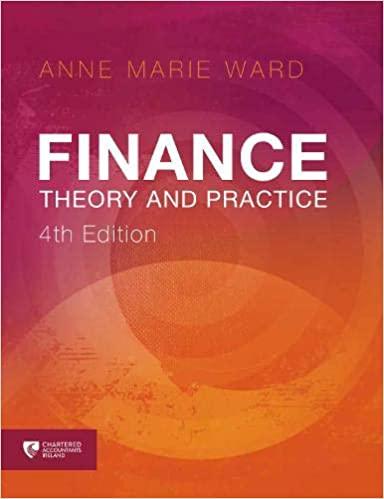Question
Boisjoly Enterprises is considering buying a vacant lot for an after-tax cost of $1.1 million. If the property is purchased, the companys plan is to
Boisjoly Enterprises is considering buying a vacant lot for an after-tax cost of $1.1 million. If the property is purchased, the companys plan is to invest another $5 million after taxes today (t = 0) to build a hotel on the property. The after-tax cash flows from the hotel will depend critically on whether the state imposes a tourism tax in this years legislative session. If the tax is imposed, the hotel is expected to produce after-tax cash flows of $500,000 at the end of each of the next 15 years. If the tax is not imposed, the hotel is expected to produce after-tax cash flows of $1,000,000 at the end of each of the next 15 years. The project has a 12% WACC. Assume at the outset that the company does not have the option to delay the project.
- What is the projects expected NPV if the tax is imposed? Negative value, if any, should be indicated by a minus sign. Do not round intermediate calculations. Round your answer to the nearest cent.
$ - What is the projects expected NPV if the tax is not imposed? Negative value, if any, should be indicated by a minus sign. Do not round intermediate calculations. Round your answer to the nearest cent.
$ - Given that there is a 45% chance that the tax will be imposed, what is the projects expected NPV if management proceeds with it today? Negative value, if any, should be indicated by a minus sign. Do not round intermediate calculations. Round your answer to the nearest cent.
$ - Although the company does not have an option to delay construction, it does have the option to abandon the project 1 year from now if the tax is imposed. If it abandons the project, it will sell the complete property 1 year from now at an expected price of $6 million after taxes. Once the project is abandoned, the company will no longer receive any cash flows. Assuming that all cash flows are discounted at 12%, will the existence of this abandonment option affect the companys decision to proceed with the project today? Negative value, if any, should be indicated by a minus sign. Do not round intermediate calculations. Round your answer to the nearest cent.
$
-Select-Yes, the project should be accepted now.No, the project should still be rejected.Item 5 - Finally, assume that there is no option to abandon or delay the project, but that the company has an option to purchase an adjacent property in 1 year for an after-tax investment of $1.6 million (outflow at t = 1). If the tourism tax is imposed, the expected NPV of developing this property (as of t = 1) will be only $500,000 (so it doesnt make sense to purchase the property for $1.6 million after taxes). However, if the tax is not imposed, the expected NPV of the future opportunities from developing the property will be $4 million (as of t = 1). Thus, under this scenario, it makes sense to purchase the property for $1.6 million after taxes (at t = 1). Assume that these cash flows are discounted at 12%, and the probability that the tax will be imposed is still 45%. What is the most the company would pay today (t = 0) for the $1.6 million purchase option (at t = 1) for the adjacent property? Negative value, if any, should be indicated by a minus sign. Do not round intermediate calculations. Round your answer to the nearest cent.
$
Step by Step Solution
There are 3 Steps involved in it
Step: 1

Get Instant Access to Expert-Tailored Solutions
See step-by-step solutions with expert insights and AI powered tools for academic success
Step: 2

Step: 3

Ace Your Homework with AI
Get the answers you need in no time with our AI-driven, step-by-step assistance
Get Started


